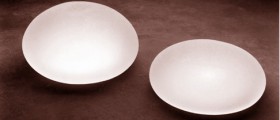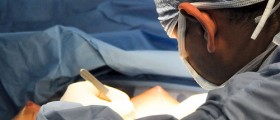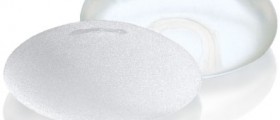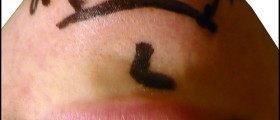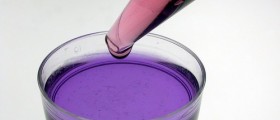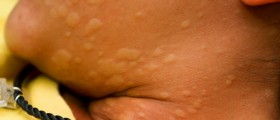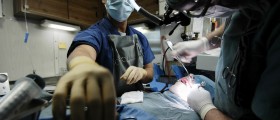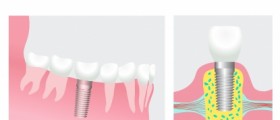Did you have them removed ? And is the hives better? I’m having same issue and was wondering if it helped
Loading...
Did your hives ever go away? I’m 6 weeks post op currently experiencing hives like everyone else.... no one seems to have a happy ending here
Loading...
I had a mastectomy with implants as part of my reconstruction. Everything was fine for years but then 3 years ago, I started to get hives on my legs. I thought it was bug bites. I would take antihistamines and they would go away. Over time, they've been getting worse and nothing helped. I started getting angioedema and only prednisone was helping. I recently had my implants removed and no more hives! I was able to have a DIEP FLAP surgery which wasn't an option when I fist got diagnosed. No swelling, nothing for the last 6 months after thinking I was going to have to deal with chronic hives for life and being told it wasn't related to the implants. The best part is that I'm not even lactose intolerant anymore. I wish I had gotten them out sooner.
Loading...
YES! YES! OMG YES!!! I had mine done Nov of 2017. The summer of 2019 I began to break out in hives everywhere. I’ve had food allergy tests done and began eliminating those foods, I started purchasing and drinking teas to help with inflammation, I begrudgingly took allergy pills (doc said double dosage every day). I’ve had other suspicions about my health with the implants- and my husband & I have been looking for a doctor with our financial situation to be able to remove them.
Again, this morning & woke up with hives all over my entire body. I searched “breast implants hives”. That’s how I found this post! Thank you for confirming I’m not the only one. If your suffering is anything like mine, I am so sorry!
Again, this morning & woke up with hives all over my entire body. I searched “breast implants hives”. That’s how I found this post! Thank you for confirming I’m not the only one. If your suffering is anything like mine, I am so sorry!
Loading...
I can definitely vouch and confirm that Breast Implants have caused me a great deal of issues, such as hives. Within the first few months of getting implants (Textured Saline) which is still Silicone Shell, I was dx w Dermatographism. However, this was many many years ago when there was no such internet (1998) or any info available on Breast Implants that we had access to. Fast forward, once I found info on the internet in 2015, I found many other girls having same exact issue. I immediately had them removed, but by this time I had them in for over 18 years. I also had them analyzed and they were found to be degraded textured shells. So, basically the textured silicone I believe is floating around in my body bc I am reacting to pretty much everything I come in contact with. It's been a living hell. I am so sorry for those experiencing this as I believe that it all depends on the type of implants, the length of which you had them and perhaps genetics play a huge roll in the outcome of your issues and healing. Thank you so much for posting this as I hope that this helps spread awareness. I have been scratching non stop for over 20 years now. My heart breaks for anyone else who is dealing with this.
Loading...
Get the implants removed. Had hives and after removal of implants the hives went away 2 months later. Never came back. So glad to be off of daily antihistamines.
Loading...
It’s a year now- have you found out what the cause was?
I have the same symptoms as you and have been put on zrytec as well. I’m hoping I don’t have to take it everyday!
I have the same symptoms as you and have been put on zrytec as well. I’m hoping I don’t have to take it everyday!
Loading...
It’s a year now- have you found out what the cause was?
I have the same symptoms as you and have been put on zrytec as well. I’m hoping I don’t have to take it everyday!
I have the same symptoms as you and have been put on zrytec as well. I’m hoping I don’t have to take it everyday!
Loading...
It’s a year now- have you found out what the cause was?
I have the same symptoms as you and have been put on zrytec as well. I’m hoping I don’t have to take it everyday!
I have the same symptoms as you and have been put on zrytec as well. I’m hoping I don’t have to take it everyday!
Loading...
It’s a year now- have you found out what the cause was?
I have the same symptoms as you and have been put on zrytec as well. I’m hoping I don’t have to take it everyday!
I have the same symptoms as you and have been put on zrytec as well. I’m hoping I don’t have to take it everyday!
Loading...
I had breast implants a year ago. 2 weeks after I developed chronic hives. I saw my plastic surgeon who says he’s never heard of this reaction to breast implants. I’ve never been allergic to latex. I’m under the care of an allergist who tells me he doesn’t think the removal will help but I’m beside myself tired, and irritable all of the time with his recommendation of taking 5 mgs of xyzal as well as 180 mgs of Allegra twice daily. This is crazy!!!
Loading...
Health Hero
1626 posts
Hello.
Allergic reactions and sensitivities to breast implants are relatively rare but not unheard of. Some individuals may develop an immune response to the materials used in the implants, such as silicone or other components. This immune reaction could manifest as chronic hives or other symptoms.
If you suspect that your breast implants might be causing your symptoms, it's essential to consult with medical professionals who are experienced in dealing with breast implant-related issues. This may include both plastic surgeons and allergists who have expertise in dealing with such cases.
Here are some steps you can consider taking:
(1) Seek a Second Opinion: If your current allergist doesn't believe that removing the implants will help, consider getting a second opinion from another allergist or an immunologist who may have more experience in evaluating and managing implant-related allergies.
(2) Consult a Plastic Surgeon: While your plastic surgeon may not have encountered such a reaction before, it might be beneficial to consult with other plastic surgeons who have experience with patients experiencing allergies or sensitivities to breast implants. They may be able to offer additional insights and treatment options.
(3) Comprehensive Allergy Testing: Work with your allergist to perform comprehensive allergy testing to identify any other potential triggers that may be contributing to your symptoms. This can help you better understand your overall allergic profile and make informed decisions about your treatment.
(4) Consider Removal: If you and your medical team determine that the breast implants are the likely cause of your symptoms, removal of the implants may be a viable option to explore. However, this decision should be made after careful consideration and consultation with your plastic surgeon and allergist.
(5) Lifestyle and Stress Management: In the meantime, focus on lifestyle changes that might help manage your symptoms, such as reducing stress, getting enough rest, and maintaining a balanced diet.
Good luck!
Allergic reactions and sensitivities to breast implants are relatively rare but not unheard of. Some individuals may develop an immune response to the materials used in the implants, such as silicone or other components. This immune reaction could manifest as chronic hives or other symptoms.
If you suspect that your breast implants might be causing your symptoms, it's essential to consult with medical professionals who are experienced in dealing with breast implant-related issues. This may include both plastic surgeons and allergists who have expertise in dealing with such cases.
Here are some steps you can consider taking:
(1) Seek a Second Opinion: If your current allergist doesn't believe that removing the implants will help, consider getting a second opinion from another allergist or an immunologist who may have more experience in evaluating and managing implant-related allergies.
(2) Consult a Plastic Surgeon: While your plastic surgeon may not have encountered such a reaction before, it might be beneficial to consult with other plastic surgeons who have experience with patients experiencing allergies or sensitivities to breast implants. They may be able to offer additional insights and treatment options.
(3) Comprehensive Allergy Testing: Work with your allergist to perform comprehensive allergy testing to identify any other potential triggers that may be contributing to your symptoms. This can help you better understand your overall allergic profile and make informed decisions about your treatment.
(4) Consider Removal: If you and your medical team determine that the breast implants are the likely cause of your symptoms, removal of the implants may be a viable option to explore. However, this decision should be made after careful consideration and consultation with your plastic surgeon and allergist.
(5) Lifestyle and Stress Management: In the meantime, focus on lifestyle changes that might help manage your symptoms, such as reducing stress, getting enough rest, and maintaining a balanced diet.
Good luck!
Loading...



